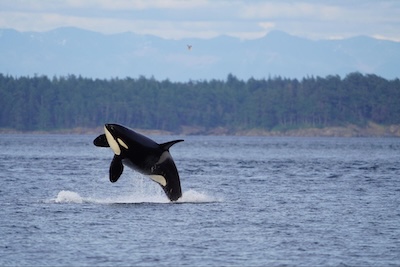DCLDE 2026: Killer whale (Orcinus orca) ecotype and other species annotations for the Detection Classification Localization and Density Estimate (DCLDE) conference in 2026
Killer whales (Orcinus orca) exhibit significant ecological and genetic diversity,
with three primary sympatric ecotypes in the Northeast Pacific: Resident, Bigg?s (Transient),
and Offshore. Each ecotype is adapted to distinct ecological niches, with unique foraging
strategies, social structures, and vocal behaviors. These differences underscore the
challenges in monitoring and conserving each group, as they coexist within overlapping
geographic ranges yet do not intermix. This dataset, compiled from diverse sources,
provides a comprehensive resource for the detection and classification of killer whale
vocalizations. The >225,000 call-level annotations collected from 23 locations, and
a cleaned annotation csv that collates annotations across the different protocols.
Recordings spanning eleven years from various geographical locations within the Northeast
Pacific Ocean, collected using multiple hydrophone systems. It addresses the challenge
of differentiating killer whale calls from other marine species and environmental
noise and includes specific instances of confounding signals to enhance model robustness.
Detailed annotations capture a broad spectrum of vocalizations and associated metadata,
facilitating the development of advanced machine learning models for ecological monitoring.
This curated dataset aims to improve the accuracy of killer whale detection algorithms,
support conservation efforts, and advance our understanding of killer whale acoustic
communication across different ecotypes.
- Cite as: Department of Fisheries and Oceans Canada. 2025. DCLDE 2026: Killer whale (Orcinus orca) ecotype and other species annotations for the Detection Classification Localization and Density Estimate (DCLDE) conference in 2026. NOAA National Centers for Environmental Information. https://doi.org/10.25921/15ey-mh50 [access date]
- doi:10.25921/15ey-mh50
- NCEI Metadata ID:gov.noaa.ncei.pad:DCLDE_2026_Killer_Whales
gov.noaa.ncei.pad:DCLDE_2026_Killer_Whales
| Search Data |
|
| Download Data |
|
| Distribution Formats |
|
| Ordering Instructions | Contact NCEI for other distribution options and instructions. |
| Distributor | NOAA National Centers for Environmental Information ncei.info@noaa.gov |
| Dataset Point of Contact | Passive Acoustic Data Manager Passive Acoustic Data Manager DOC/NOAA/NESDIS/NCEI > National Centers for Environmental Information, NESDIS, NOAA, U.S. Department of Commerce pad.info@noaa.gov |
| Dataset Point of Contact | NOAA National Centers for Environmental Information ncei.info@noaa.gov |
| Time Period | 2005-06-17T00:00:00 to 2023-08-23T23:59:59 |
| Spatial Bounding Box Coordinates |
West:-151.85
East:-122.61
South:47.36
North:60.31
|
| Spatial Coverage Map | |
| General Documentation |
|
| Publication Dates |
|
| Dataset Progress Status | Ongoing - data is continually being updated |
| Data Update Frequency | As needed |
| Purpose | These data are intended for the building of detection and classification models for different ecotypes of killer whales. |
| Dataset Citation |
|
| Principal Investigators |
|
| Publishers |
|
| Acknowledgments |
|
| Theme keywords | Global Change Master Directory (GCMD) Science Keywords
|
| Data Center keywords | Global Change Master Directory (GCMD) Data Center Keywords
|
| Platform keywords | Global Change Master Directory (GCMD) Platform Keywords
|
| Instrument keywords | Global Change Master Directory (GCMD) Instrument Keywords
|
| Place keywords | Global Change Master Directory (GCMD) Location Keywords
|
| Use Constraints |
|
| Access Constraints |
|
| Other Constraints | Cite as: Department of Fisheries and Oceans Canada. 2025. DCLDE 2026: Killer whale (Orcinus orca) ecotype and other species annotations for the Detection Classification Localization and Density Estimate (DCLDE) conference in 2026. NOAA National Centers for Environmental Information. https://doi.org/10.25921/15ey-mh50 [access date] |
| Fees |
|
Last Modified: 2025-03-08
For questions about the information on this page, please email:ncei.info@noaa.gov
